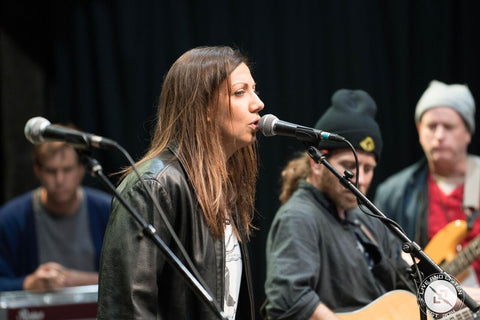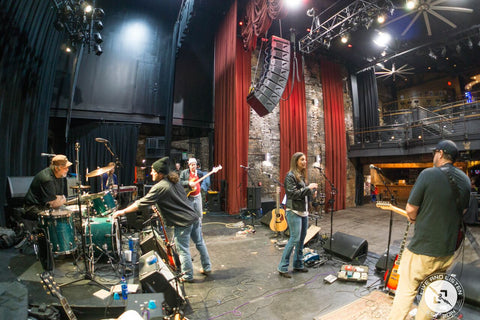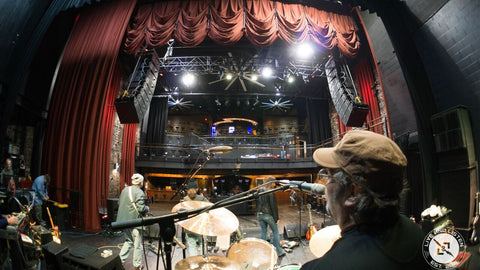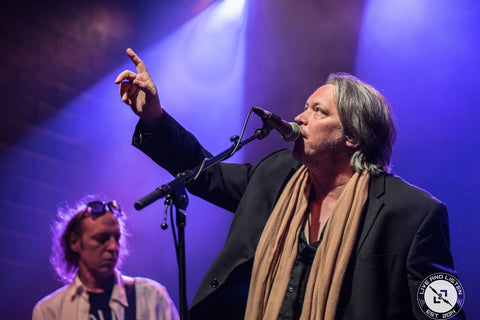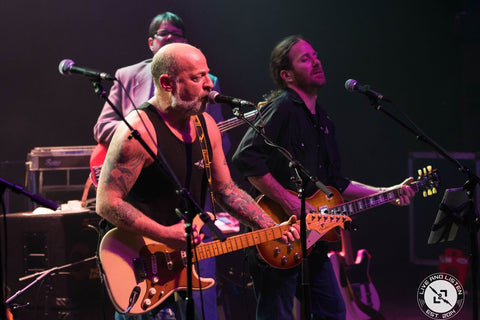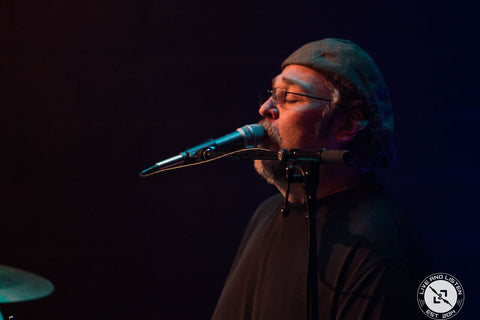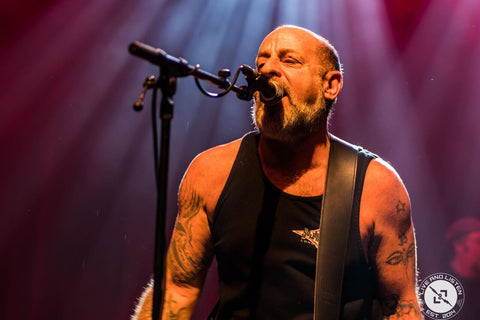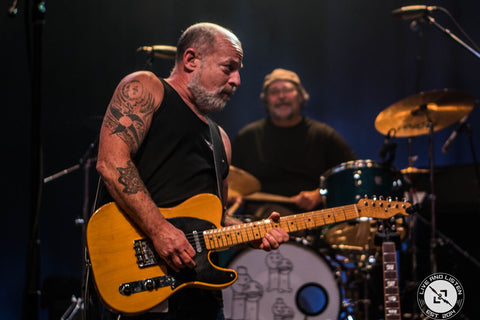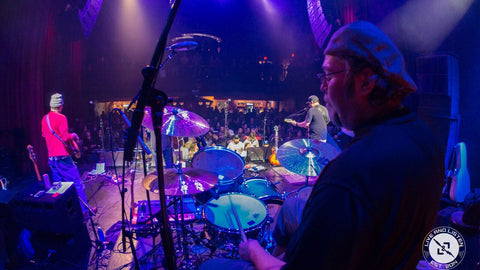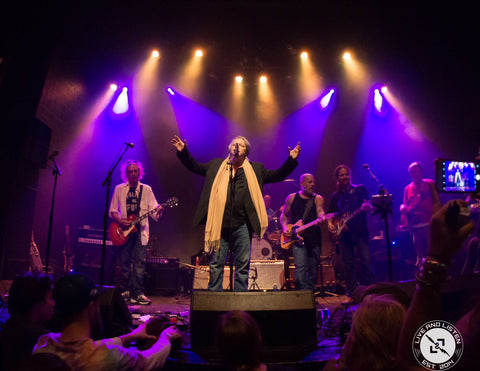News
The Musicians' Musicians: An Interview With Todd Nance & Friends August 15, 2018 10:33

Interview by Erika Rasmussen
Photos by Christan Newman
In every industry, there are the consummate professionals that others seek out. In the world of tunes, these are the musicians’ musicians. The people that highly talented and creative artists listen to and with whom they want to collaborate. The people who write the music that us nerds can all bliss out to. Folks like Col. Bruce Hampton (Retired), Big Star, Leon Russell, and the luminary like.
I had the rare and fortunate opportunity to sit down with six of these examples in the modern era. These gentlemen share a body of work that has interwoven over the years in such acts as Bloodkin, Widespread Panic, Drive-By Truckers, Barbara Cue, Blueground Undergrass, Aquarium Rescue Unit, brute., and a number of others. And that’s quite a formidable résumé. When the group of friends and peers were all in Asheville recently to perform under the moniker of “Todd Nance and Friends”, I got to sit down with them and geek out about all things music. Here’s how that all went down.
Ok, so I do I want to warn you guys that I was quite the talented drummer in sixth grade when we all had to choose chorus or band so I don't want the legend of my “Wipeout” performance to intimidate any of you going into this. You just have to forget about the reputation I built up at Bragtown sixth grade.
(laughter)
So, when you guys come here to Asheville is there anywhere that you like to go? I know during the day you gotta rest, but is there anything that you hit here with all the fatty food and heady breweries and hipster hangouts?
MOSIER: We went to Sierra Nevada today. It was cool.
We couldn't get in; it was, like an hour and a half wait.
MARTINEZ: We went kinda early and there was still a decent line.
You’re troopers. We gave up and went to the seedy BBQ joint instead and it was pretty good.
NANCE: Luella's. That's good.
That’s my favorite. Imma steal that mirror ball disco pig one day. It’s going home with me.
MARTINEZ: I like Sunny Point. I don't make it there too often, though.
Yeah, you have to go up there early too.
MARTINEZ: I passed it.
So, if you guys are on the road and you stop at a gas station, what kind of junk food do you get?
NANCE: I get pistachios.
Shelled or lazy?
NANCE: Shelled. Salty shelled.
So it gives you something to do and...
NANCE: No, I just like pistachios (laughs). You can pick 'em out too quick if they're already shelled. You gotta pace yourself.
So what do you guys eat on the road? Like, not what you tell your wife you eat, but what you really eat when you stop at QuikTrip in Burlington.
MARTINEZ: My wife knows exactly what I eat. She watched me look at, and she tells the story all the time, we were at a kiosk of cinnamon buns and she said to Tori (Pater), "I wish he looked at me that way..." (laughter all around) I was like "damn, look at that!"
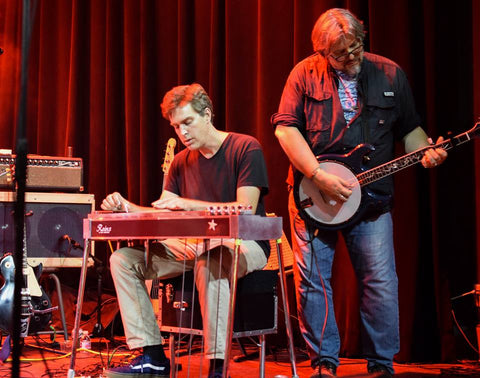
“Look at the curves on that thing…” Have you ever heard the Louis C.K. skit about people in line at Cinnabon? There's no one happy in line at Cinnabon?
JN: Yeah yeah yeah (laughs) he stopped at one when he was leaving the airport.
Yeah. Even better. If you have to get your fix on your way out, that's a whole new level of Cinnabon hell. (laughter) Speaking of on the road, when you get to go somewhere very "hallowed", like Muscle Shoals, or when you worked with Terry Manning and there was some guitar that was supposedly Robert Johnson’s, do you ever feel that, like, magic around those places and those instruments or is it "this is all hype that we've all built up in the urban legend folk persona?"
NANCE: In some places, it's actually documented, you know, the Robert Johnson guitar will, it's not officially documented but they're pretty damn sure
It stays in tune, right? You don't tune it?
NANCE: You don't tune it. If it stays in tune with itself, you just, well, that's what we did
And the sound at Muscle Shoals is hard to reproduce
NANCE: The whole vibe there, too, is just...
I just don't know if I get into that whole fan girl thing like this is magic and I watched the documentary which is so amazing and-
NANCE: I love that stuff
Yeah. Now. I have a theory that the guy who's the drummer in the band is the guy who "gets things done" and is the toughest and strongest in personality. This may be another stereotype, but think about Jon Bonham, right? Bill Kreutzmann used to be the guy that would punch people out if they didn't pay the band. Charlie Watts punched out Mick Jagger for saying, "where's my drummer?"
NANCE: I love that story!
MARTINEZ: In his suit! Got dressed in his suit.
Yeah! Got dressed in his Savile Row suit first.
NANCE: Are we talking about punching people out as gettin' shit done? (laughter)
Hahaha. Or just being tough mentally.
NANCE: Gettin' shit done! (laughter)
I mean, even Animal in the Muppets, they modeled him after that stereotype. He's the toughest in the band. If no one paid the Muppets, they'd definitely send in Animal. (laughter). Do you see that in drummers or that could be anyone and they just get that...?
NANCE: That could be anyone.
Do you see that in you?
NANCE: I just wanna play my drums and take it easy. I'm not looking for trouble. (smiles)
MOSIER: He's one of the most mild mannered drummers I’ve ever seen.
I was gonna bring that up. You don't tear through your kit like Bonham and other drummers...
NANCE: No...
And he never thought they were precious. Do you keep your kits?
NANCE: Oh yeah.
Do you collect other kits?
NANCE: (laughs) I’ve got enough of my own.
That's true. You collect guitars, right?
NANCE: Yeah, I do have a guitar collection, it's not a huge collection, but-
MARTINEZ: He's got some badass guitars.
I know I’ve heard you talk about a hollow body Gibson?
NANCE: Yeah, I’ve got an ES-330
That's interesting! I'm listening to Clapton's autobiography now-
NANCE: There ya go! (laughs) But it belongs to my brother, it's on permanent loan.
Ahhhhh. I see. In your storage facility, yeah. So I am actually listening now to Clapton's autobiography talk about how he had the generic mock-off of the 335 was the k-something? And when he knew I’ve really made it was when he could buy an es-335. He was "holy shit, I’m a professional".
NANCE: (laughs)
And I don't know a lot about guitars so I don't even know that was such a big deal til recently. Any other really notable in your collection? Or, to you, they're all notable. They're in your collection....
NANCE: Yeah, John Neff gave me a lap steel, which I’m kind of fond of.
Oh really? Do you get to play that often?
NANCE: At home, but I’ve been so lazy lately that I haven't really touched my guitars very much.
Yeah. It seems like, even for a guitar player, the lap steel is such a different instrument. I can't imagine knowing all the layers of that. Do you guys collect your own instruments? Different instruments other than what you play?
JN: Yeah
What is your weird and freaky “Ripley’s Believe It Or Not” instrument?
JN: I don't know...I have an electric sitar.
Really?!?
JN: Mmmm-hmmmmm.
I don't think I even knew that was a thing. Is that like Beatles psychedelia Indian electric sitar?
JN: It's not as exotic as a real sitar. But it sounds buzzy it has a bridge, it's strung tuned just like an electric guitar but the bridge is a buzz bridge and it gives it that buzzy sound.
I could see that. Do you guys have any interesting instruments in your collection, collecting dust at home?
HUTCHENS: I don't think of it as a collection, I have a number of guitars at home, but I play 'em-
That's true. If you play it, it's not a "collection".
HUTCHENS: They don't hang on the wall. Although there are a few that hang on the wall....
JN: I hang 'em on the wall but I play 'em (laughter all around)
HUTCHENS: Mine have just been hangin' on the wall recently...But you know, it's not like a museum piece, and I beat the hell out of 'em and they get dirty and sweaty and scratched up.
MOSIER: It's a weapon of mass construction. (laughter)
I like that. That'll be my next t-shirt I make (referencing our earlier discussion about the stuff I’d made and worn that weekend).
MOSIER: Yeah! That's what it is.

Don't let me hear anything witty I’m just like "I want that on a t-shirt!" (laughter) Do y'all collect anything else? Does anybody have any quirky-
MOSIER: I don't have to collect banjos. I'm really blessed to the extent that I leave my window cracked on my car and I leave a banjo in there and always somebody in the public will come by and leave another banjo (laughter) with my banjo, so I’ve got like 150 thousand banjos that I’ve collected over 30 years of parking lots all over the country (laughter).
NANCE: Mosier Depository. (laughs)
MOSIER: It's just they all…they usually just put a little note on there, "Good luck".
NANCE: "I hope you give it more life than I did!" (laughs)
MOSIER: Yeah. "Take this outta my life..." (laughter)
"Take this pain!" I just keep imagining these little banjos just popping up all over the country... (laughter)
MOSIER: It's marvelous.
I love it. Does anybody have any quirky collections? Or when you're on the road is there any random thing you collect?
NANCE: I had a friend and she always wanted a refrigerator magnet from whatever state I was in or city, so I would go out on a little quest at these truck stops.
MOSIER: (laughs) I did that for my kids.
NANCE: Did you?
It's nice to have a thing to look for. It gives you a reason to get out and look and interact. You're like "Man, I gotta find another magnet. I have five skylines of cities, gimme something new."
NANCE: Yeah. I don't have to do it anymore because I think she got all of the states I go to, she got one from there already.
Nice. When I was a kid and we had the pens that you tilt and they'd slide and the picture'd be revealed? Like of a lady’s boobs? That was my thing.... (laughter)
So, I find the drum-guitar crossover interesting. I always hear blues guitarists talking about "bending the note" with their string and I’ve wondered before, is that something you can or want to or tried to bring to percussion? Like with a flick of the wrist or inner-to-outer edge?
NANCE: You can do it with timpani, the foot pedal.
Oh, right.
NANCE: And there are other-
MOSIER: What's the talking drum?
NANCE: The talking drum is where there are cords that hold the heads together and then they're on the same cord and you squeeze it and tightens the tension on it and you got this little curl stick that looks like a walking cane. Actually, I’ve seen one that was a floor tom and you would, it had like a kick pedal or a high hat pedal you would step on and it would change the pitch. I can't remember where I saw it. But I have seen one of those.
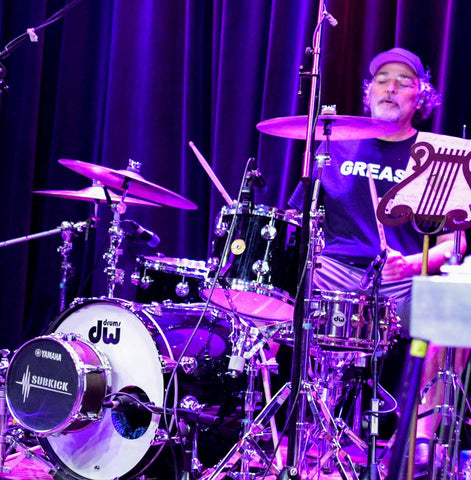
Have you found other guitar or other instrument tricks that you've found you could translate over? I think that's fascinating all the subtleties that everyone in the audience isn't even aware of. Or have you now fine-tuned your set-up? What defines your sound? Do you have one with what you've refined over the years as your set-up, do you think?
NANCE: Yeah, I think all of us could answer and say 'yes' to that. It's like these guys, it's easier for me to play a rental kit, it's not as hard as if you've got a certain amplifier or certain outboard gear you use and stuff like that. So, yeah, everybody tries to keep their general sound about them and have that available now.
Yeah, cause I’m in my Clapton phase now and he was talking about how his sound was modeled after Freddie King and that high thin sound, but because he brought his amplifier closer and had more distortion, it became the Clapton sound. So, have you ever, maybe when you were starting out, modeled your sound after someone do you think? Even consciously or subconsciously?
NANCE: No, not, no...
MARTINEZ: I’ve been trying to copy Eric Carter since day one. (laughter)
HUTCHENS: Can't be done.
MARTINEZ: I’ve been trying.
MOSIER: I’ve tried to sound like Bela Fleck and after five attempted suicides, I quit trying. (laughter) He's just the master. Amazing. He's just great. I’ve met him and he's a great guy, too. But he helped the banjo more than, in this kinda world, I could even say.
I’ve just started learning more about banjo. I know a luthier outside of Raleigh who's taught me more about banjo and strings, James Griggs.
MOSIER: I know who you're talking about. I’ve heard the name.
I figured. He's taught me more of the ways because he realized how poor my education was in the banjo arts. So have you guys learned any tricks that translated over from another instrument or have you invented anything like 'Oh, this is the Hutchens English Flick of the Wrist'?
HUTCHENS: No, I don't think so. I think you just, or to me, find what you're comfortable with. Not looking for a trick. And I think with a lot of us it's just a kind of second nature, like you know what works for you.
Like, what doesn't give you carpal tunnel syndrome? (murmured agreement)
HUTCHENS: All the experimentation, I could know pretty quickly when I play a certain guitar if it suits me.
And now you guys have better guitars and they're not strung as high and you're not having to kill yourself hopefully...
HUTCHENS: I’ve definitely had worse guitars.
I honestly didn't even realize til a few years ago the difference that that made and I think it's so hard to play a good guitar-
HUTCHENS: Yeah.
I just don't have the hands to fit it, so I can't imagine having to really grab up there.
HUTCHENS: I play heavy strings, anyway.
Oh really?
HUTCHENS: I’m used to playing rhythm, and like, a solid chord, so-
So they don't snap as often but it's gonna be harder to play?
HUTCHENS: Yeah, there's a difference, but you know. It's all relevant to what you do.
I'm such a nerd about that stuff. (To Todd) I noticed how low your drum kit is and Ashley was saying that's a jazz kit and Chris was saying it's also adjusted for your back to not hurt to be-
NANCE: Well, also it's low, too, cause it's just a 20" kick drum and my big ass behind it makes it look small.
Like Bonham aping it up behind the drum!
MOSIER: You really are bigger than it seems. When we were in the car, I was like, "How tall are you?!?" (laughter)
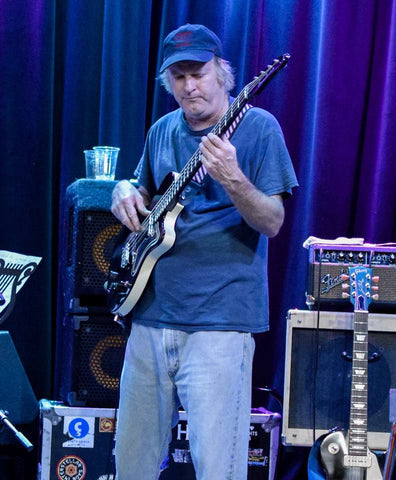
Yeah. We always see you sitting! You know we have these big dogs in the hotel this weekend that are way over 25 pounds? The joke is that if we get busted, we're standing them beside Big Jimmy for scale so they seem tiny. (laughter, as the dogs have been the running entertainment of the weekend)
So another thing I find interesting is the technology interface that's kind of coming about. You've come a long way from having the phone receiver tied to your head with a bathroom belt (for phone rehearsals) to Bluetooth headsets and ears and all that. Does that make it easier for you guys? Do you miss the simplicity of not having so much?
NANCE: Saved my hearing.
Good! Okay.
NANCE: If I hadn't started wearing "in-ears" 20 years ago, I’d be deaf as a post.
Right. What about the social media?
NANCE: I don't...I haven't looked at it.
It's not your thing. And, full disclosure, I work in technology and my company works in making concerts more interactive and that's something I may get into, but the thing is how interactive does...? Because the audience wants interactivity, the venue wants interactivity because that feeds sales, but is the band like "Jesus, another point of interactivity? Can we not have the green room sacred space?” Or, is it interesting to see the interactivity during that? I think that's such a controversial issue. Some bands are "Gimme all the data you can" and-
NANCE: But that's not the music.
Right. Even when I’m writing a show up, I don't take my phone out, I don't take notes, I think it's very distracting. And I get paid a whole buncha money to push technology, but in the show, I think that's sacred. I dim my watch (laughter at my Apple watch), I put my phone away, so that's what I worry about. Are we pushing it too far? Is it one more burden when you have so much going on already in your headspace?
MOSIER: There's no replacing being there.
Right.
MOSIER: You get the most pixels when you're there. We're the highest definition. So, that's what it's for. It's a medicine we made for ourselves and we purvey these things called songs and package this wonderful material of polyrhythms, lyrics, melodies, and hopefully help the people feel better than they did when they got here. If they had a gun in their mouth, they'll pull it out. They'll just feel more hopeful. Now more than ever, even with all the technology, it's the need for just standing in the shower of sound coming off that stage is something that I need, we need it, and the people out there need it. It's just an amazing powerfully magical life-changing substance, and that's music. It's just incredible and there's no technology, there's nothing that could come up that could jazz up the jazz.
Yeah! That's a good way to put it.
MOSIER: You can't jazz up the jazz. And music is truly…it doesn't need to be jazzed up.
I think that's a good point that it's so unifying and there's very few places that you can go to today like that. You can go to a sports arena and even a fan of the same team may argue with you about a referee's call. If you go to church, there's controversy about who made the pound cake. This is one of the few places that we can just come together and just openly, freakily love each other. (laughter). So, what do you see on the horizon for y'all? Each of you or together?
NANCE: We're just gonna see how this goes and if it keeps rolling down the hill then we'll just keep riding it. If the wheels don’t come off. We've all got to a place now where we've got time to get together and do this and before we were all a little too busy, you know?
Right.
NANCE: To do just a couple single shows here or there or wherever....
Right...half-assedly? Not that y'all would do anything half-assedly...
Mills: Yeah.
NANCE: What were you gonna say?
Mills: I was just agreeing about the half-assed part. (laughter)
Mosier: I’m just hired; I’m not on the board of directors.
A contractor.
Mosier: I’m a hired gun.
Martinez: He's our gunslinger. "Banjo...Banjo..." (sung in a western tv show style)
(laughter)
What kind of recordings have you not released? Isn't there a kids recording?
HUTCHENS: Yes. A bunch. A bunch.
Mills: We had a whole record that we never did anything with.
Which one? Do I know of it?
Mills: No, because nobody's heard of it.
Nance: The Romper Stompers?
Mills: Yeah.
No, I know that. I’ve heard of that.
Mills: Yeah, that was me and him and Danny and Neff.
Yeah. And I have two children so we're your target demographic.
Hutchens: There's a number of things. That's always on the-
You just wanna finish post processing or are you still recording or...?
HUTCHENS: It's just, things get backed up. I want them out. You know, you have to find the right way to do it. You have to find financing, and then the Bloodkin world, Romper Stompers, recordings with Interstellar Boys. There's a bunch of stuff, it's just not released and it's, you know, it's always something coming in the pipeline.
Where do you like to play? Music halls like this? Do you see yourself outdoors? Do you see yourself doing some sweaty festival? I'm getting ready to go to Lockn and avoid heat stroke as hard as I can.
Nance: We talked about trying to get on some festivals.
I didn't know if you enjoyed that anymore.
Nance: You get a huge crowd, you get paid, you get exposure, you're on a big ass stage, and they accommodate everything you need.
Mosier: Great way to see music, too. You get to see your friends. Kind of like the watercooler for musicians. Otherwise, we don't get to see each other. So, there's a lot of magic that happens with sit-ins and collaborations and workshops. It's just more heady and sweet and nice and it's very lucrative. And you get word of mouth, like Todd said. It's a very human way to present music. It's very communal.
I like that about Jam Cruise. I got to do that once, and just all the random impromptu set-ups. You know, they're sitting on the deck, the guys from Love Canon.
Mosier: They're great.
Imma let you guys relax before the show, I really appreciate your time. I hope they weren't questions you've been asked a million times.
Nance: Those were better questions than most.
Oh, good.
Nance: "What's your favorite color? How'd you name your band?" (laughter)
I listen to music audiobooks all day long and interviews. And I get bored of that. First of all, if you're a fan, you'd know the basic facts and second of all, that doesn't really speak to YOU. Like "tell me your favorite color", unless it was the blue of your grandmother's eyes.
Mosier: The great Col Bruce Hampton, one of the things that he taught us on some level, it IS all the same. If you're playing Danny Boy in a nursing home, or if you're in Madison Square Garden, the gigs are the same. The tenets of music. It requires the exact same attention no matter what the crowd. It's easy to look at the crowd and the budget and the hype and the delusion and all that, but, that's why I'm here because I know why they're here and how they play and we're on the same page that way.
It's a thoughtful interaction, like what he had. He (Col Bruce) was on that Jam Cruise of course. He was on all of 'em. And my last conversation with him was about this framed artwork where they took all the Jam Cruise luggage tags and put 'em together for all the years he'd been there and he wanted me to bring that back with me. He's like "Shug, how am I gonna get this back?" And I go "How am I gonna get this back?!? What are you talkin' about? Col, they'll ship that for you." He goes "That's right...they will..." and we leave Jam Cruise and I go party on a sailboat for a night and I just remember thinking "Thank God I don't have Col Bruce's framed artwork on this boat right now." (laughter)
Mosier: That's right!
And I had very many wonderful interactions with that man which I'm very grateful for. I'm a lucky, lucky soul. Thank you gentlemen. I'm gonna wrap this up.

Listen to Todd Nance & Friends' show at Isis Music Hall (08.10.18) here:
Listen to Todd Nance & Friends' show at Isis Music Hall (08.11.18) here:
The Ghost of Mr. Johnny Cash Dumped Out My Cocaine: The Story Behind the Song January 8, 2018 15:34
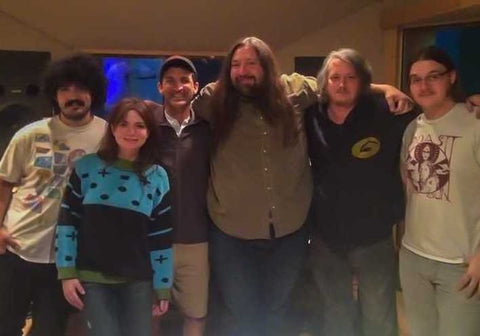
Erika Rasmussen: Danny and I share many mutual friends and came to know each other as an Athens certainty. We’ve gone back and forth for a while on ways to combine our love of writing in a collaborative project. We cooked up the idea of a series of writings, each featuring a different song and a different musician. When I got a chance to work on this project, of all the songs in Danny's amazing library, this was the first song I jumped on. And I’m so glad to know the backstory and appreciate the song even more now. No story of the South is complete without some of our seniors appearing as old growth trees in this ever-changing landscape. And getting the input of my beloved Dave Schools about this amazing song? Well, that’s the ice cube in my drink.
Sometimes the opening line to a song makes you do a double take and take stock of the band all over again. Try this one on for size: “The ghost of Mr. Johnny Cash dumped out my cocaine, At least my Mama told me he did…” I was enjoying another raucous night in the Classic City, watching Bloodkin do what they do best. This was at their annual “Bloodkin & Friends” show, this year burning down the house at The 40 Watt Club. I thought I knew Bloodkin's songs and their style by this point. I wasn't the only one who did a double take at the opening line of this song, either. It’s an attention-grabber. This song has a different twang to me that is irresistible. It doesn’t hurt that Danny sprinkled some of my musical heroes throughout the song’s lyrics. “Waylon Jennings says I’ll go to hell, if I don’t change my evil ways…Waylon Jennings ought to know mighty well.” I may lean towards this song because “American Country Ghosts” has the driving heartbreak sound of some of my favorite bittersweet ballads. Danny's poetic imagery and authentic Southern angst are reminiscent of a Patterson Hood rant or a Sarah Shook tale of woe. This is the kind of song that you find yourself walking around singing and, more importantly, contemplating, for days afterward.
So pull up a chair. Pour a finger (or two) of whiskey. And sit back for the story behind the song.
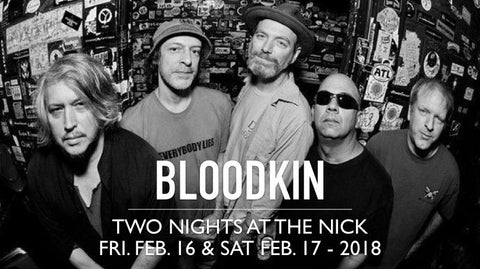
Click here to stream/purchase Daniel Hutchens' album, The Beautiful Vicious Cycle of Life. Catch Bloodkin in Birmingham at The Nick after both nights of Widespread Panic at the BJCC in February!
Daniel Hutchens: Toward the end of her life, my mother, Frankie Irene, developed dementia and was no longer able to live on her own. In previous years she seemed to anticipate what was coming, and was fearful about the idea of being placed in a “nursing home.” (Modern and politically correct terminology is “assisted living”, “senior living”, etc., but Mom called these places “nursing homes.”) Mom and I had a deep bond, always emotionally close, though we disagreed about plenty and could certainly do our share of bickering. I think I inherited some of her pure Appalachian stubborn. But anyway, some years back, she and I came to an agreement: she told me, “Danny, when the time comes, I want to live with you. Keep me out of those places as long as you can.”
So I did. Mom moved down from West Virginia to live with me in Athens, Georgia in 2011, and stayed with me for 3 ½ years. Until finally my siblings and a small army of doctors convinced me her condition had deteriorated to the point where I couldn’t provide the kind of 24 hour care she needed. That was a judgment call I just couldn’t bring myself to make, and Mom fiercely protested the idea too, when I’d try to.
Mom developed “sundowning” (a condition where moods are extreme and strongly influenced by changing light), and some days she would alternate between bleak depression and fits of rage. And her overall condition intensified; eventually she had zero short term memory, would eat a meal then stand up from the table and ask when we were going to eat, etc. She was also delusional and often asked when we were going to be leaving on some imagined journey, or insistently tried to find a person who had been dead many years. She sometimes woke me by leaning over my bed and asking where one of her long-dead husbands had wandered off to, saying, “I was just talking to him a few minutes ago.” It was a chilling jolt, waking up that way.
But during that sorrowful chaos of Mom’s last year in my house, I really didn’t get much sleep anyway. I stayed up with her all hours, trying to calm her fears. She was often worried and downright scared of something nameless, and wouldn’t drift off to sleep til sunrise. So I sat there in her room and talked with her through many a long night.
Songwriting has always been, among many other things, my form of therapy. And some pretty dark songs worked their way out of me during those distressing days, watching Mom’s decline. One day she walked into the living room in tears and told me, “Danny, I can’t find myself!” That phrase shook me, and I wound up writing a song with Todd Nance called “Can’t Find Myself” (still unreleased).
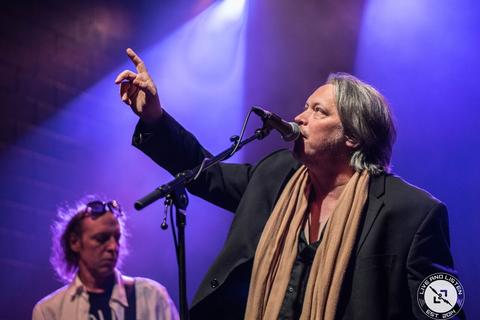
Another time, I was asleep and dreamt a cinematic version of what later became “American Country Ghosts.” I saw the story in that dream first, and it played out like I was watching a spooky old movie: a dream version of Mom’s old house in West Virginia, and I was living there with her again, but she was still lost in her dementia and slowly dying. And she was relaying messages to me which she said she’d received from the ghosts of great Country Music stars passed: Johnny Cash, Hank Williams, Patsy Cline, and Waylon Jennings. It was a rotten, sad dream emotionally, but the imagery was so strong I had to write it down as soon as I woke up.
At the same time Mom was struggling, my marriage was fraying, finally leading to a divorce. These events plus the deaths of some dear friends took their toll on me, and I think contributed to some physical ailments. I finally had a minor stroke in 2016, but a few years before that I wound up in an emergency room in San Francisco due to extreme high blood pressure, which ended a Bloodkin acoustic tour of the West Coast. I flew back to Athens to recuperate, and that’s when Dave Schools came to town.
Dave was camped out in John Keane’s studio, mixing the first Hard Working Americans album, and he had invited me to drop by. So one afternoon I meandered over to say hello, and sat with Dave and John awhile and listened to a few mixes. Which were sounding great, and prompted my offhand remark, “Man, this makes me want to make another record.” To which Dave replied, “Well…let’s make one.”
It was that simple. That’s what started the ball rolling for what became my third solo album, The Beautiful Vicious Cycle of Life. I already had a good crop of songs ready to go, which were my stories and confessions about the rough patch I was living through. A few of the songs directly referenced the situation with Mom, including the title song, and most specifically, “American Country Ghosts”.

It was a country song, probably alt-country would be the working category, and I already heard it pretty full-formed in my mind before we began recording over at David Barbe’s Chase Park Transduction studios. Dave Schools produced, Barbe engineered, and we found some great musicians to bring it all to life:
Duane Trucks brought a great sense of vitality and fun to the sessions, and his drumming was rock solid. (This was right before he got the call to step in as Widespread Panic’s drummer; to my knowledge, “Wings and A Walking Cane” is the only recorded track both Duane and Todd Nance play on.) Schools had told me, “Duane’s 24, but don’t worry. He doesn’t play like he’s 24.” Schools himself, as always, brought raw power and creativity with his bass playing. Then we were lucky enough to get finishing touches from brilliant players like Jesse Aycock (a Tulsa native turned Nashville multi-instrumentalist who has played with the likes of Hard Working Americans and Elizabeth Cook), Frank MacDonnell (guitarist for the iconic Athens band The Glands), Coley Duane Dennis (guitarist for the extraordinary instrumental band Maserati), William Tonks (Mike Mills Rock Concerto, Barbara Cue and many others), and Eric Carter (my longtime partner in Bloodkin). Plus Thayer Sarrano layered her keyboards, pedal steel and beautifully ethereal vocals (besides her solo work, she has collaborated with Hope For Agoldensummer, of Montreal, T. Hardy Morris, Cracker and many others).
We wanted to catch a whiff of that original dream essence on the take for “American Country Ghosts”, and I think we did. Jesse’s pedal steel and Thayer’s keyboards provided some of that elusive midnight mood, while Dave and Duane laid down a groove that left me wide open to drop my vocal in the pocket.
These are the people who made Beautiful Vicious happen. (Along with some dear friends at Havin’ A Ball Productions out in Houston, who came through with the financing.) When it comes to songwriting, after all the life experiences and philosophical meandering and dreams, none of it matters if you don’t bring the blueprints to the studio or stage and finally turn on the juice. And these folks cranked it up. Their talents blended into the soulfully haunted “Southern Gothic” rock that Schools and I were looking for. It’s a record I’m particularly proud of, but it was shortchanged in terms of its release and promotion, and I’m currently looking to add bonus digital tracks and rerelease the whole project in the future. Hey, that’s the music business.

“American Country Ghosts” has become one of the most-requested songs I’ve ever written. People always ask for it at live shows, and I get a lot of questions about it on social media. I’m glad it’s turned into such a positive; it came from such a dark place, but that’s the alchemy of music. Just like the Blues. Hearing songs about bad luck and depression can become powerfully uplifting, because you think to yourself, “Hey…someone else out there felt the way I’m feeling. I’m not the only one.”
I like to think of the song as a kind of collaboration with my Mom. A last little gift she was able to give me despite the obstacle of her dementia, her pain and terror and confusion. Like a cool radio station breaking through the static. She was a grand example of unconditional love and put-your- money-where-your-mouth-is country Christianity; she really did think about the welfare of others, always. She’d tell you in no uncertain terms when she thought you were sinning or acting the fool. But then she’d take you in and feed you and help you along your path, any way she could.
“American Country Ghosts” is her song, alright. Same with “Can’t Find Myself”. The sad stories of her last days. But then I also think of a song I wrote back in 2008 that wound up on the Bloodkin record “Baby, They Told Us We Would Rise Again”. That song is called “Rhododendron”, and Patterson Hood honored me by writing, “As a lover of fine Southern literature I can put the [lines of the song] alongside the finest writing I’ve ever seen.”
“Rhododendron” is more a celebration of Frankie Irene’s life overall, and that’s probably what Mom would have preferred. Focusing on the positive. Which I’ve certainly been trying to do this last year, and I happily report that I’m on the mend, and receive encouraging reports from my doctor. Maybe I learned a couple lessons while I was down there in the trenches. Again, the credit goes to Mom.
“God’s own little wildflower. My wild Rhododendron.”

Dave Schools: It was quite an honor when Daniel Hutchens tapped me to produce a solo album for him. I was well aware of the power of his writing as Widespread Panic has recorded many of his tunes and I have witnessed the palpable responses of audiences far and wide when we perform Danny’s music. The impact of his songwriting is undeniable.
One of the bullet points that Danny and I discussed before recording was the idea of creating a core backing band that was of Athens yet unlike anything that listeners had ever heard before complementing his songs. As producer I wanted to be able to sonically represent the emotional impact of these highly personal and often biographical songs and I felt that the disparate backgrounds of the players would help us achieve the goal.
It was a stylistic roll of the dice but it paid off immediately because all of the players understood and adhered to my favorite studio mantra: SERVE THE SONG. And what songs we had to serve.
“American Country Ghosts” was one of the lynchpin tracks in a stack of excellent songs that Danny and I had selected to record and I was further excited by the fact that we had assembled a crackerjack band to back him up: David Barbe (who was also engineering the recording at Chase Park), Duane Trucks, Thayer Sarrano, and myself. Featured on this track is also Tulsa native Jesse Aycock on pedal steel. Danny himself was the constant rock solid foundation of all the tracks as he patiently held the rudder while the band learned the arrangements on the fly. His steady rhythm playing on acoustic perfectly matched the sometimes snarling and always spot on vocal performances. More often than not Danny’s performances are one take masterstrokes.

Having known Danny personally for decades and knowing the struggles he has weathered I felt it was important to insure that the music the group created was an emotional compliment to these highly personal lyrics and that it would in no way cloud the impact of the story told. In this respect the band soared, waiting for the right moments to unleash their personal best on the tracks.
“American Country Ghosts” was also one of the first tunes we cut and was the first time I heard Thayer Sarrano perform. Watching her leave her body while consumed by the gravitas of the song during her piano outro remains one of my favorite studio moments. The restraint of the band until the emotional build at the end of the track is a great example of how we served the contemplative nature of the lyrical content.
More importantly, “American Country Ghosts” is a unique slice of personal songwriting in the canon of Americana music. Written from the perspective of a man who is dealing with the impending mortality of his mother and the onset of her dementia, he questions the choices he has made in his life as his mother is visited by spirits of country music greats, like Johnny Cash who dumps out his bag of cocaine, and Patsy Cline who reminds him that his mother is a saint. A perspective that seems more and more rare in today’s world of phony sentimentality and self-aggrandizing music.
Here is a songwriter who isn’t simply willing to let his own blood for the listener. Here is a songwriter that has no choice but to pour his inner demons as well as his personal victories out through his art for all to hear and feel. This is something we could use a lot more of in this crazy world.
-Dave Schools: January 6, 2018

Click here to stream/purchase Daniel Hutchens' album, The Beautiful Vicious Cycle of Life
"AMERICAN COUNTRY GHOSTS"
The ghost of Mr. Johnny Cash dumped out my cocaine
At least my Mama told me he did
She’s 90 years old, she’s seeing ghosts again
I shouldn’t have brought that shit in her house but I was hurting so bad
Watching Mama coming to an end
(Chorus)
American Country Ghosts
I can’t see ‘em but my Mama can she tells me what they say about me and how I wrecked my life again
Hey, tell me something I don’t already know American Country Ghosts
Now if you can
Patsy Cline says my Mama’s a saint and I should show her more respect
Like apple pie and the 4th of July
Them shiny medals I could never quite hang around my neck Hank Williams says my wife and kids they miss me
But then he drinks my whiskey and he rips up my alimony check
(Chorus)
(Bridge)
Mama says they wanna talk to me I’d rather hear their sad old songs Mama says they’re pissed off at me
They say I’ve been the outlaw all along
Waylon Jennings says I’ll go to hell if I don’t change my evil ways
Waylon Jennings ought to know mighty well I hear he had his share of evil days
I don’t know why these ghosts give a damn anyway but I’m staying here til Mama leaves
So I’ll listen to what they say
(Chorus)
American Country Ghosts
I can’t see ‘em but my Mama can...
Written by Daniel Hutchens
From the record The Beautiful Vicious Cycle of Life
Released April 2016
"CAN’T FIND MYSELF"
I can’t find myself
Who was I supposed to be
I don’t know who you’re talking to I don’t know if you know me there’s frost on my window glass I think this is July
And I can’t find myself there’s something in my eye my friend
And I can’t find myself tell me what to do
Should I just sit here or wash some clothes this house is turning blue
There’s something I was gonna ask there’s something on my mind but I just can’t turn it over
It’s leaving me behind my friend
(Chorus)
Did you see me just the other day I was laughing and I felt okay
I saw a bluebird in the backyard
Then he flew off and I took it pretty hard my friend
I can’t find myself
I’m not sure if I’m there
There’s a full moon in my mirror there’s an echo everywhere
I guess I could take a little walk
And find out where I go
I’ll start down by the bluegill pond i’ll start off nice and slow
My friend
(Chorus)
(Bridge)
All you’ve done for spite I ain’t gonna tell on you
All the times you wanna fight I’ll stand toe to toe with you I’ll be true I’ll see it through my friend
I can’t find myself where do you think I am
I used to live up in New Mystic then I moved back to West Virginia so smile when you think of me happy times we used to know I don’t know who you’re talking to I don’t know if you know me now my friend
(Chorus)
Written by Daniel Hutchens and Todd Nance Unreleased
"RHODODENDRON"
Life's a mystery
But it's fragrant as an apple tree swelling her blossoms in July
In the Ohio River valley
The sky's distorting with the heat a kiln-slicked glaze of baby blue
And there's always hard work to be done in the Ohio River valley
She grew up in Silverton drew well water for her family
Laid silverware by the breakfast plates and reckoned she was happy
On a little farm not far from here where the hillsides and the valley
Were tangled thick with summer's blazing fireworks bouquets
(Chorus)
Of wild rhododendron wild rhododendron
Wild rhododendron
wildflower wild rhododendron
Wild rhododendron Wild rhododendron wild
And her daddy was a bus driver and her mama was a teacher
And they worked backbreaking hard to raise their children
With a touch of Old Testament iron and a whiff of wild rhododendron
Life's a mystery
But it's tempting as an apple pie cooling a November windowsill in the Ohio River valley
The skies are low and concrete grey the countryside's bare and brambly
But there's always hard work to be done in the Ohio River valley
She grew up in Silverton drew well water for her family
Laid silverware by the breakfast plates and reckoned she was happy
On a little farm not far from here where the hillsides and the valley will soon be drifted deep with snow while seeds wait down below
To bring springtime's rhododendron
(Chorus)
Life's a mystery
But it's beautiful as she is god's own little wildflower my wild rhododendron
Written by Daniel Hutchens
From the record Baby, They Told Us We Would Rise Again
Released February, 2009
All songs © Wet Trombone Music BMI
The Interstellar Series: An Interview With Daniel Hutchens October 13, 2017 14:31

Photo by Craig Baird: Home Team Photography
Interview by Jordan Kirkland: Live & Listen
Earlier this year, the world learned of a new super group out of Athens, Georgia known as the Interstellar Boys. Led by former Widespread Panic drummer Todd Nance, this band would feature the likes of Jerry Joseph, Daniel Hutchens (Bloodkin), Sam Holt, John Neff, and Jon Mills. The band has now completed a full tour and is in the midst of a weekend run through the southeast. Over the next week, we will be rolling out a three-piece interview series with Jerry, Danny, and Todd in an effort to learn more about this new and exciting project. We're continuing this series off with our recent interview with singer/songwriter Daniel Hutchens, which can be read in full below. This run of shows kicked off on Thursday at Soul Kitcchen in Mobile (AL) on October 12th, with shows at Martin's in Jackson (MS) on October 13th, and Tipitina's in New Orleans (LA) on October 14th to follow.

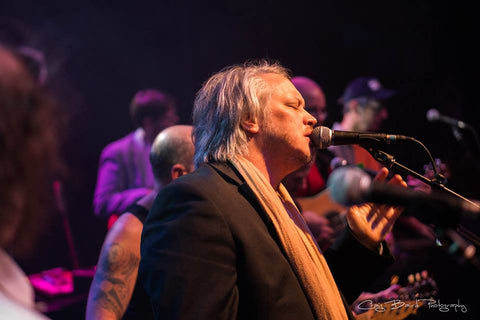


The Interstellar Series: An Interview With Jerry Joseph October 11, 2017 14:13

Photo by Ryan Lewis Photography
Interview by Jordan Kirkland: Live & Listen
Earlier this year, the world learned of a new super group out of Athens, Georgia known as the Interstellar Boys. Led by former Widespread Panic drummer Todd Nance, this band would feature the likes of Jerry Joseph, Daniel Hutchens (Bloodkin), Sam Holt, John Neff, and Jon Mills. The band has now completed a full tour and is preparing for a weekend run through the southeast. Over the next week, we will be rolling out a three-piece interview series with Jerry, Danny, and Todd in an effort to learn more about this new and exciting project. We're kicking this series off with our recent interview with singer/songwriter Jerry Joseph, which can be read in full below. You can catch the band in at Soul Kitchen in Mobile (AL) on October 12th, Martin's in Jackson (MS) on October 13th, and Tipitina's in New Orleans (LA) on October 14th.

The roots clearly run deep with this group. What were your initial thoughts as the Interstellar Boys came to life? Tell me about those early conversations about starting a new band.
Jerry: Well…I’m trying to be careful with my words here. I think that originally, we had played two shows. There was a Todd & Friends show back in the summer before last in Denver. You know what? I guess it’s fucking common knowledge. So, it was a lot about Todd getting sober…and I’m sober. And at one point, I was probably more famous for being a heroin addict than I was for anything else I did. So, it was kind of about supporting Todd. Get back in the game. It was really cool. Danny was there. Sam Holt was there. Most of those guys were all there. I don’t think I had ever met Jon Mills before. And then there was another show around last Christmas. It was the traditional Bloodkin jam thing. That sort of turned into the ‘Danny had a stroke’ show. I think the reason they got me involved was to try to get them all to do fucking yoga. I think a lot of it was about that.
A lot of it was about creating a vehicle, primarily for Todd, to jump back in the game. Several of these guys have been pretty good friends of mine. I’ve known Sam for a long time. He was actually my crew guy for forever. I’ve known Todd since ’86, and me and Danny were both kind of slated to be big rock stars for Capricorn, and instead, at the eleventh hour, they didn’t sign me or Danny. They signed Panic and Col. Bruce (laughs). I think that was part of it, and as the conversations continued, I think it became clear that it was a pretty cool Athens thing. If it only was drawing on Todd songs, Danny songs, Sam songs….and then mutual friends like Vic Chesnut or Mike Houser, it was probably going to be the one band that could actually do some of that material.
I was very clear that I didn’t want to be in a Mikey Houser tribute band. Mike was my friend, but I’ve got a lot of dead friends. I think as it started rolling along, that’s what was really cool about it. I’ve always had this connection to Athens because of Panic, but it’s sort of deeper than that. I think that’s what it started to morph into.
Gotcha. Well you touched on this a little, but how would you say that the song selection / overall catalog has played out thus far? What can fans expect with the setlists on the upcoming tour?
Jerry: I think it’s a pretty good cross section of all of the principal writers. I consider Danny Hutchens to be…and I stand on the quote where Steve Earle is talking about Justin Townes Earle and Townes Van Zandt. You know, that quote where he says, “Townes Van Zandt is one of the greatest songwriters that ever lived, and I’d stand on fuckin’ Bob Dylans fuckin’ coffee table and tell him so." I kind of feel the same way about Danny Hutchens. I think he is one of the finest American songwriters that there is. Period. Fuckin’ period.
So, for me, I feel like there is some attempt to try to make sure we’re presenting the facts that whatever the various singer has. I know with these kind of things, because I was in that band Stockholm Syndrome, where we really has to resist doing the hits. Peter Jackson would hate it that I said that. We have no interest in going out and playing fucking Panic tunes. Even though we wrote them. So, it’s like, we want it to be cool first, and if the stuff fits…awesome. I think, speaking for myself as a fan, there is so much talent there. Todd has some really cool songs. As does Sam. I love doing that stuff. Some of the Mikey stuff that we’re doing is really great, like this song “Bull Run.” I’m sure we could sit out there for a long time and cover him and Vic Chesnut, but we are songwriters. I know we’re going into the studio on Monday. We’re gonna try to start working on some of these new songs.
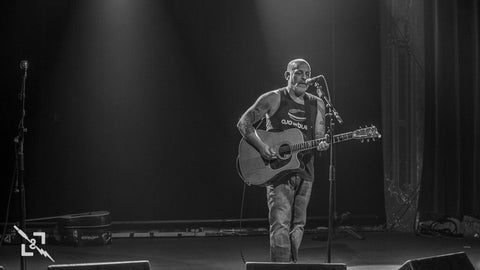
Photo by Ryan Lewis Photography
I’m glad you said that, because the next thing I was going to ask is how much focus on writing new material? How has the balance in songwriting played out between you guys?
Jerry: Well, it just got started. So, we met for these shows, and had maybe one rehearsal. All these fuckin’ southern guys man. They’re so god damn slow. They talk slow. They play slow. I’m giving ‘em shit, you know? You know how the eskimos have fuckin’ fifty words for snow? It’s like Interstellar Boys have fifty words for slow. I think with with Panic, it’s what they do too. I sit on stage at a Panic show and the count starts, and you’re like, “What the fuck?” I would go, “1,2,3,4!” Those guys are more like, “1…2…go get a cup of coffee…3…4.” But it works, because it’s a big buffalo of a fuckin’ machine.
This is kind of like that. John Ness is amazing. It’s kind of the same thing. I’m from Portland, Oregon. It’s a little hard for me to get used to. It’s a different mentality. I know that the south has its fair share of punk bands, but at the same time, there is that thing with the sludge everybody drinks down there. I think it’s the thing that makes it so authentically American sounding and charming at the same time. I’ve gotta say…I’m decidedly the outsider in this whole thing.
Are the rest of the guys originally from the southeast?
Jerry: I don’t know. I think Danny is from West Virginia. Todd is from Chattanooga. Sam is from who the fuck knows. I couldn’t speak for Jon Mills. They’re all pretty deep, southern players though. I think they just have me in this band so there is a clear target to shoot at from the fuckin’ Trumpers down there. I’m there to take the fuckin’ bullet (laughs).

Photo by Jordan Kirkland: Live & Listen
While there is so much history between each of you, you're all quite accomplished within your own endeavors. What's your personal goal for The Interstellar Boys? What do you feel that the future holds for the band?
Jerry: I’d like to see everybody survive it. That would be great. I’d like to see them all get into Bikram yoga…start eating salads (laughs). I don’t know, man. You know that band Magpie Salute? I went to that show the other night. It’s fuckin' Marc Ford…wicked players. I’m a pretty big Black Crowes fan. Even though, I would again stand on that same theoretical coffee table and tell you Bloodkin was doing it before the Crowes were. They were doing it more authentically. I remember being at Johnny Sandlin’s right when that first Crowes single came out. We were like, “What the fuck is this?” Bloodkin was killing that shit. It was the real deal.
Bloodkin was the real fuckin’ deal, but I grew to be a big Black Crowes fan. At first, I don’t know if I was sold. But by Amorica, I was like, “This is one of the greatest rock bands in America.” So I’m watching this Magpie Salute thing and trying to figure out how it’s doing it’s thing, right? Rich [Robinson] wrote all of those songs. They have all of these players, and it’s been pretty thought out. I think this band should be striving to…if I had my way, we would just be in Europe. Pushing this idea of what I think is a natural authenticity of this Athens music. I hate the term ‘southern rock’, but it’s decidedly southern. It has the elements of that stuff that I like. I’ve always thought Dan should be this massive star. I don’t know if Interstellar Boys is the vehicle for that, but when it hits it’s whatever that is…it’s a pretty new band...I don’t know what that is. When it’s working, I think you can tell.
It’s a weird thing, you know? You can’t practice fucking your girlfriend. You just know when you’re nailing it. It’s the same thing. Cooking is the same thing. You try to make those enchiladas that you had fifty times before, and you never really get it. Then it happens and it’s like “Boom! How did they do that?” Some people would say that’s God. So, I don’t know what that thing is, but when it hits, it’s cool. I guess, the answer to your question is that I would like to see that be presented to as many people as possible.
Watch Interstellar Boys perform "Raise The Roof" > "Down" in Colorado here:
Very cool. So, the music industry has evolved tremendously since the early stages of your career. What would you say are the challenges and also the advantages associated with forming a new band in 2017?
Jerry: I’ve said this before. I was at some awards thing. I forget why in the world they would ever give me an award. Oh yeah…it was the Oregon Music Hall of Fame. I had to do this speech. What I said, and what I say a lot…I do this thing where I have been taking guitars to war zones. I’ve been to Afghanistan, and I just got back a few months ago from Iraq. I took guitars to Syrian refugee camps on the Iraqi/Syrian border. I try to teach these kids that there is a way out of the tent…or the cinder block thing that they’re in. I say this to them, and I say this any time I’m actually talking about music in front of a group of people. I think that it’s a pretty weird time to be a musician and be in your 50s. You know? It’s damn near impossible to figure out. Like, what the fuck, man? Nobody buys a record. Nobody wants a CD.
My BMI checks used to be huge. They’d probably cover my mortgage, and now they’re nothing. Spotify plays are like no money. So, you bemoan that and worry that…and all of my record store owner friends…the promoters are still making money, but they always have. The musicians don’t. That said, I think that in the history of humanity…making art. I think since the first cave dwellers figured out that you could put blueberry juice, blood, and charcoal on the walls and make a picture of a fuckin’ water buffalo (laughs), since that moment in humanity where they figured out how to make that art. This is the most exciting time to make art in the history of the world…if you’re twenty. I think for a twenty-year-old, right now, never in history has there been a more exciting time to make art. Any art. There are no fuckin’ rules. You can create your own paradigm.
Between figuring out social media and being interconnected with so many people. I’m with some kid in Cabo or Afghanistan writing a song, and the next thing you know, he’s got a kid in New Zealand or Edinborough listening to it. The intersourcing of ideas, the ability for the first time ever to be like…fuck the industry. You know? Fuck these promoters. I think these young people can actually break through. I’m not sure how, and I don’t know if that will happen for me ever, but it’s a world where…being in a rock band is a weird thing. We were talking about it the other day. In 1986, we got paid $150 to open for somebody. That was the opening band price. And it’s still the same fucking price. You’re playing a show and say “We’ll have these guys open.” They ask, “What’s the budget?” And you’re like “It’s $150.” That hasn’t changed in 30 years? I can assure you that the cocktail at the bar…it’s price has gone up.
Take a bunch of 50 year olds, put them in a van…I don’t know man. But for young people…I have a four year old and a seven year old. If they want to make art, it’s a super exciting time to do that. The future is unwritten. I think it’s super cool. Being able to connect globally. Being able to use all forms of all colors in the pallet. It’s all available. It’s like…watching EDM go “BOOM!” It’s a super exciting, cool time to be making art. For us, all bets are off. I think we have really great songs, and it’s a really cool band. It would be great if people came and saw it. I don’t totally know how you market that though. I don’t mean to sound skeptical. It’s hard, though. I mean…one answer to your question is, “Who the fuck knows? It’s really hard.” If you had a twenty-year-old Danny Hutchens and half of a brain right now, you could have some massive global start. It’s an exciting time, for sure. I think its also a time where the message is really important. What’s the band saying….I know for me, I’ve got zero interest in artists who aren’t saying something.
I would hope that this band can move through a lot of that. I don’t think me and Danny are really from that as much. You know…that jam band mentality of, “We’re not gonna risk anything politically. We’re just gonna sing about hula hoops and whiskey.” I’m hoping that those days are over. With The Interstellar Boys, I think they keep a big roll of duct tape back stage, so when I start spouting my mouth off, they can get it around my lips (laughs). But it’s a cool band, man. I think we can make a really good record. I think there are a lot of people in different parts of the world that could really love it. It goes beyond the southern thing, which is great. I think it holds up with whatever its being compared to.

Photo by Jordan Kirkland: Live & Listen
When did you say you’re hitting the studio again?
Jerry: The first try is on Monday with Dave Barbee. It should be cool.
So one more question just to wrap things up. This is kind of an extension on the topic of the new era of music. I know one result is that there is no shortage of music to choose from. Who's been on your personal playlist this year? Who is Jerry Joseph listening to in 2017?
Jerry: I haven’t heard a lot of records this year that are just fuckin’ killing me. Like last year, the first three records on my list were really sad. They were Leonard Cohen’s goodbye record, Bowie’s goodbye record, and Nick Cave’s Skeleton Tree, which is about his fifteen-year-old song dying. It was kind of this trifecta of sadness. The other one at the top of my list was the new Truckers record, because it was fuckin’ brilliant. I can’t say that I’ve loved a whole lot of new records. I like this guy John Moreland. In the middle of all of this americana, this guy’s voice and the shit he sings about is so brutal and beautiful that I could listen to that record a lot. Who else have I been listening to? Sometimes I find that it’s a lot of the same stuff. I like this band from Scotland called Frightened Rabbit. My friends have a band called Cronin, and they’re working with a guy from Memphis named John Murray. He put out a record a few years ago called The Grace of Age, which was a really fine record. He’s got a great new album out. I haven’t heard that band, for me, that’s rewriting the book.
Every so often, music seems to go into this thing. It’s all the same thing. “Oh look, it’s another beautiful song-writer from Nashville…singing’ about their girlfriend.” I like a lot of the international stuff. Everywhere I go, there is some cool local band. And I’ve been a lot of places this year. I don’t know…the problem with Spotify, even though they have that Discover Weekly thing, is you tend to play the same shit over and over. Then there are enough rock stars dying that I’ve probably spend an inordinate amount of time listening to dead guys. Guy Clark died. Gregg Allman died. Tom Petty died. You spend all your time listening to your favorite records by the guy who just died. I’ve done that a lot. I think being sad, listening to your dead heroes, and anticipating the next fuckin’ gun massacre…I think that’s what we’re doing for the next years. What happens next week? I think its the new American past time.
You definitely make a fair point. Thanks so much for taking the time to sit down and share your story with me. I'm really looking forward to watching this band and seeing how things unfold in the future.

Win Tickets To See The Interstellar Boys At WorkPlay On Saturday June 6, 2017 13:33
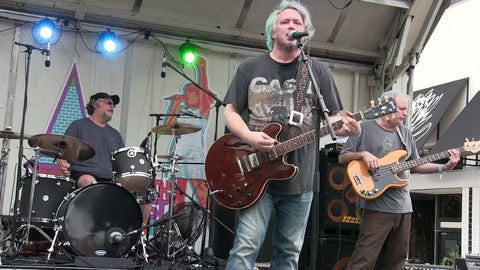
We're teaming up with our friends at C4 Productions to offer a pair of general admission tickets to see The Interstellar Boys at WorkPlay in Birmingham, AL on Saturday night (7/29). Simply share this post directly from our Facebook page and tag a friend in the comments section of the post to enter the contest. We will announce a winner on Saturday morning.
COLLABORATION OF VETERAN MUSICIANS BRING DECADES OF EXPERIENCE TO NEW BAND HITTING THE ROAD IN SUMMER 2017
Featuring:
Todd Nance – Drums, Vocals Sam Holt – Guitar, Vocals
Daniel Hutchens - Vocals, Guitar John Neff – Pedal Steel
Jerry Joseph - Vocals, Guitar Jon Mills - Bass
The Interstellar Boys are first and foremost borne from a collection of friendships. Musical friendships that date back as far as 30 years. Todd Nance, Daniel Hutchens, Jerry Joseph, Sam Holt, John Neff and Jon Mills have shared stages and songs over the years and now form a new band that draws on those decades of collaboration. Todd Nance brings undeniable experience and depth to the band as a founding member/drummer/songwriter of Widespread Panic. Daniel Hutchens has been a driving force with the band Bloodkin for 29 years (and counting) and is widely recognized as one of the South’s great modern day songwriters. Jerry Joseph and his various bands have been recording and touring on a national/international scale since the 80’s. Jerry’s expertise as a musician/songwriter is as unquestionable as his passion for sharing the power of music. He has recently toured and taught music in such far-flung places as Afghanistan, Ghana and is soon to perform in Iraq. Sam Holt brings a reverence and intensity to playing the guitar that energizes the faithful fans of this community in a way that is second to none. John Neff (formerly of Drive-By Truckers) is the secret weapon that adds depth and soul via the pedal steel. And Mr. Jon Mills (professor emeritus of bass in the Athens, GA music scene) is the glue that keeps the whole thing tastefully held together.
Fans and industry veterans alike will find this band a compelling draw for its maiden voyage this summer season as evidenced by comments from Raleigh, NC based talent buyer Chris Malarkey (Lincoln Theatre): “When I was first approached about the possibility of bringing this lineup to town I thought ‘man, this is too good to be true’. The thought of some of the most talented musicians to ever to walk through the doors of my venues joining forces not just for a show, but for a new band, seemed farfetched at best. But, somehow, someway the stars aligned, schedules were cleared and plans were made. The Interstellar Boys are real. What I can only describe as a dream band is booked.”
This accomplished group of musicians and songwriters look to explore new terrain touring together this summer….and have their eyes on the horizon to create new material, get into the studio and keep pushing boundaries as they have always done. Amongst the upcoming summer tour dates is a stop at Birmingham's WorkPlay on Saturday, July 29th. Nashville singer/songwriter Betsy Franck will be opening the show and sitting in on a handful of tunes with the band. The event is hosted by C4 Productions, and further information is linked below.
For more information on the INTERSTELLAR BOYS, visit the band's official website.
Click Here: Join The Official Facebook Event Page For Interstellar Boys At WorkPlay
Purchase Tickets To See Interstellar Boys At WorkPlay On July 29th
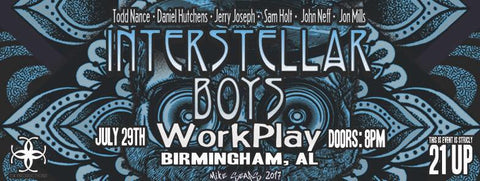
2017 SUMMER TOUR
|
7/14/17 |
Denver, CO |
Oriental Theatre |
|
7/21/17 |
Asheville, NC |
ISIS Music Hall |
|
7/22/17 |
Raleigh, NC |
Lincoln Theatre |
|
7/23/17 |
Charleston, SC |
Home Team BBQ (Downtown) |
|
7/28/17 |
Atlanta, GA |
Terminal West |
|
7/29/17 |
Birmingham, AL |
WorkPlay |
|
7/30/17 |
Chattanooga, TN |
The Revelry Room |
*More Dates TBA
Purchase Tickets To See Interstellar Boys At WorkPlay Theatre On July 29th
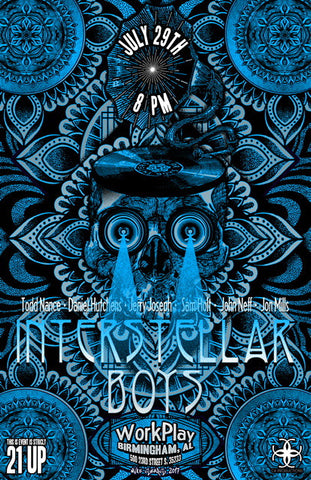
Todd Nance's New Project 'Interstellar Boys' Announce Summer Tour Dates March 31, 2017 14:55
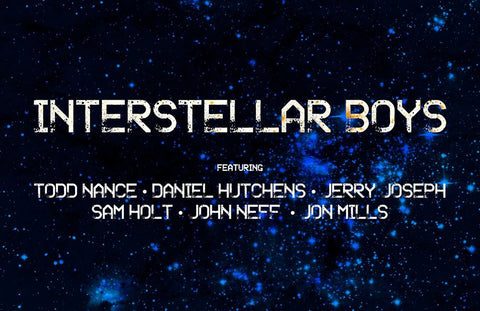
COLLABORATION OF VETERAN MUSICIANS BRING DECADES OF EXPERIENCE TO NEW BAND HITTING THE ROAD IN SUMMER 2017
Featuring:
Todd Nance – Drums, Vocals Sam Holt – Guitar, Vocals
Daniel Hutchens - Vocals, Guitar John Neff – Pedal Steel
Jerry Joseph - Vocals, Guitar Jon Mills - Bass
The Interstellar Boys are first and foremost borne from a collection of friendships. Musical friendships that date back as far as 30 years. Todd Nance, Daniel Hutchens, Jerry Joseph, Sam Holt, John Neff and Jon Mills have shared stages and songs over the years and now form a new band that draws on those decades of collaboration. Todd Nance brings undeniable experience and depth to the band as a founding member/drummer/songwriter of Widespread Panic. Daniel Hutchens has been a driving force with the band Bloodkin for 29 years (and counting) and is widely recognized as one of the South’s great modern day songwriters. Jerry Joseph and his various bands have been recording and touring on a national/international scale since the 80’s. Jerry’s expertise as a musician/songwriter is as unquestionable as his passion for sharing the power of music. He has recently toured and taught music in such far-flung places as Afghanistan, Ghana and is soon to perform in Iraq. Sam Holt brings a reverence and intensity to playing the guitar that energizes the faithful fans of this community in a way that is second to none. John Neff (formerly of Drive-By Truckers) is the secret weapon that adds depth and soul via the pedal steel. And Mr. Jon Mills (professor emeritus of bass in the Athens, GA music scene) is the glue that keeps the whole thing tastefully held together.
Fans and industry veterans alike will find this band a compelling draw for its maiden voyage this summer season as evidenced by comments from Raleigh, NC based talent buyer Chris Malarkey (Lincoln Theatre): “When I was first approached about the possibility of bringing this lineup to town I thought ‘man, this is too good to be true’. The thought of some of the most talented musicians to ever to walk through the doors of my venues joining forces not just for a show, but for a new band, seemed farfetched at best. But, somehow, someway the stars aligned, schedules were cleared and plans were made. The Interstellar Boys are real. What I can only describe as a dream band is booked.”
This accomplished group of musicians and songwriters look to explore new terrain touring together this summer….and have their eyes on the horizon to create new material, get into the studio and keep pushing boundaries as they have always done.
For more information on the INTERSTELLAR BOYS, visit the band's official website.
2017 SUMMER TOUR
7/14/17 Denver, CO Oriental Theatre
7/21/17 Asheville, NC ISIS Music Hall
7/22/17 Raleigh, NC Lincoln Theatre
7/23/17 Charleston, SC Home Team BBQ (Downtown)
7/28/17 Atlanta, GA Terminal West
7/29/17 Birmingham, AL WorkPlay
7/30/17 Augusta, GA Southbound Smokehouse (Acoustic)
*More Dates TBA
Bloodkin Calls On Old Friends For Annual Athens Celebration December 12, 2016 19:28

Veteran southern rock group Bloodkin returned to its home city of Athens on Saturday night for the 7th annual "Bloodkin & Friends" celebration at the Georgia Theatre. This night would see many of the band's extended family members reunited, including founding member Daniel Hutchens, who suffered a minor hemorrhagic stroke just two weeks prior to the show. The full list of performers included Hutchens, who appeared on vocals in the second set, as well as David Barbe, Eric Carter, Daniel Eaton, Sam Holt, Donna Hopkins, Mike Hurwitz, Jerry Joseph, Eric Martinez, Jon Mills, Todd Nance, John Neff, David Nickel, Betsy Franck, Aaron Phillips, Adam Poulin, William Tonks, Rick Williams, Mark Wilmot, and Josh Stack. The two set performance was highlighted by a variety of Bloodkin originals, as well as several tunes from the late Michael Houser (Widespread Panic) catalog, and an encore which included The Rolling Stones' "Happy."
Live & Listen's Craig Baird & Michelle Petty were on hand Saturday night to capture some special moments during soundcheck, backstage, and throughout the show. See below for a complete setlist as well as a full HD photo gallery.

Setlist: Bloodkin & Friends - Athens, GA - 12.10.16
Set 1: Jazz Funeral, Easter Eggs, Is That All There Is?, Black Jacket, Loves Getting Older, Wet Trombone Blues, Sick Of It All, Place To Crash, Ravin' Beauties, Success Yourself, My Name Is Alice, Can't Get High, Makes Sense To Me
Set 2: Think On These Things, Giraffe, War At The End Of The World, Quarter Tank Of Gasoline, Crosses By The Highway, Cynic Clinic, No Matter What, The Waker, It Was You, Can't Change The Past, Down, Sandbox, Most Beautiful Day, Way Too Loud, New Pony, Streets of Nashville, End Of The Show
Encore: Henry Parsons Died, Happy

